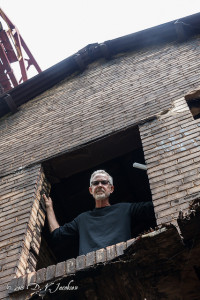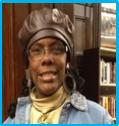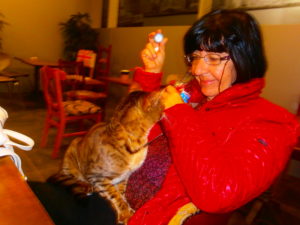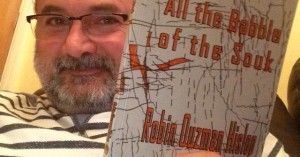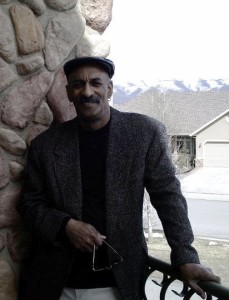LIFE AND OPINIONS OF
DOCTOR BOP
THE BURNT-OUT PROF
I. Veni, Vidi, Vici
My old man was a Moishe Kapoyr if you ever saw one.
This can be proved by the fact that, when I was a kid,
he thought I was a mazik and my brother wasn’t,
but when we grew up and my brother joined the army
and made a career of it, then he was a mazik
and I wasn’t, being around the time of which
I speak a college instructor, and I became a momzer.
How do you figure? Well, my old man respected
education, but, having very little, was jealous
of those who had it. He claimed fluency in five
languages, all of them Yiddish. “Polymath,”
I said, and he said, “I learned to count on the streets
of New York, making change from what I peddled.”
Max was my full brother and, therefore, half Irish too.
Talk about multicultural, we are it. The Irish
side weren’t keen on religion, shame to say,
so the old man had his way with us, and I guess
he forgave God for us every Yom Kippur. My mother,
a pliant woman, converted. My brother,
who is the eldest, was born at St. Vincent’s
in Greenwich Village, but I was born at Maimonides,
which may suggest a few things I won’t go into.
My brother took my mother’s Irish name into the army,
where he remains, a Captain now, I think. A mazik?
A career man in the army? And not a professor?
My old man was a Moishe Kapoyr if you ever saw one.
From such an unpromising background
how do you get started as an academia
nut, and end up having tenure? In those days,
you join the army, of course,
to get the G.I. Bill. 1947:
over a million vets enroll
in colleges under the G.I.
Bill of Rights. Illinois
wins Rose Bowl over U.C.L.A.
45-14, and, in fashion,
the “New Look” comes in,
flat tops, long skirts.
I’m way too young yet,
not even Bar Mistva’d,
but eventually I take advantage
of my country’s liberal
generosity, for which I thank
the truly great Harry S.,
et. al., and join up.
The Korean armistice was signed
at Panmunjom on July 27, 1953.
Have I got mazel! I get the
benefits without the pain.
My old man, who was drafted in the
Great War to end all wars,
sat reading “The Jewish Daily Forward,”
moving from Yiddish to English,
back and forth, back and forth,
learning. He said, “See, you did it again!”
He was pissed because Max,
my truly fabulous big brother,
came home wounded and
deciding to make a career of it,
and I got a vacation in Japan
and Hawaii and came home ready
to “take advantage of the taxpayers,”
like himself, the old batlan.
He dies in a conniption fit in ’65,
overweight and over Lyndon Johnson’s lies,
joining my mother, an angel.
When I was taking my masters at Columbia,
my old man, the meshugge maven, said:
“What do you care for a guy like that?
You said he was a pirate once. I bet
he would come and pull the pale and
take the whole shtetl away with him.
And then you say, Dean of St. Paul’s—
what would he care for the likes of us?”
“What do we care for the likes of us,”
I said, “you even failed in the rag
business, with eighteen relatives to help.”
“I had no mazel. It’s you who’s had the luck.
The grants and scholarships you’ve won!”
“Hard work,” I said, “not luck.” “Not brains,”
he said. “Your grandfather, he had brains.”
“I suppose you mean the Rabbi not the Priest.”
“Wise off, wise guy! A sober fur-cutter is better
than a drunken bootlegger.” “So why not
cut fur and get as rich as you?” I said.
“I didn’t have the eyes for it,” he said.
“You got the eyes for anything, and look at you:
John Donne Takes a Holy Shit and Writes a Poem.
Even your drunken Irish bootlegger grandpa
would be royally pissed at that!”
II. Grooves of Academe
At the Modern Language Association,
the trees are bending down and going bare, the halls
are getting knee-deep in rusty leaves, and everyone
is pointing a withered finger-stump at everyone else.
The Burnt-Out Prof is a liberal, but God, a true one.
This is one of the reasons that the Bop is burnt-out:
He finds today an atmosphere of the Inner Circle
of the old Kremlin, where “normal” means what anyone wants it to.
It is like the old days when Political Correctness meant
the Party line of the week, sometimes posted in “Pravda,”
or telephoned to London, Paris, and New York, to
prepare for diplomatic divagations, on the weekend.
This week sexy is sexist, so I don’t know how to explain myself.
I can tell you, it’s getting tough to say much of anything.
1736: Patrick Henry was born. That was also the year
that Fahrenheit died and Hogarth produced his “Good Samaritan.”
None of these things seem to have had much “impact,”
(now there’s a word that I would ban) and,
while I wend my way through this historic traffic,
toward an historic college that no longer
recognizes history as a legitimate subject,
I notice that the leaves are down and tumbling
in the wind along the road to higher learning.
Taking by storm the bastions of conditioned reflex,
I sat down to reflect on the mystery of life,
but found myself instead considering whether to refinance
the old adobe of my dreams, now that the rates were lower.
The school had found my house for me—the school’s my mother.
I had a real mother but the school’s a better mother: Magna Mater.
(One keeps thinking of Magna-Matergate, but so far so good.)
Along the treelined drives . . . etc. Lateral thinking impinged,
and before you could say, “Peter Piper picked,”
I considered the deconstruction, not of all the texts in the school,
but of the school itself, slate by slate and brick by brick.
I could start at the highest point—was it the flagpole
or the tower clock? In an augenblick a Hamlet’s confusion befell me.
The other day I asked our professor of Medieval History a question
only to learn that her expertness (or “tise”) was restricted
to the period between when Constantine reigned alone
and St. Vladimir became prince of Kiev, with everything else
outside her field. To our professor of Medieval History
the rest of life is a mystery; no generalist, she. Life is not her field.
The middle-aged scribes on the staff correct the English
of the professors and fund-raisers alike, that no embarrassment
befalls these ivied halls. They are made of substantial stuff,
the staff, the grade- and high-school grads of yesteryear,
like Hemingway and Faulkner.
1899: John Dewey, “School and Society.” Tunc pro nunc.
Another new building is going up on the green.
I am Anarchus, King of Academe,
tenured to bring chaos to your campus.
I can say any goddam irresponsible fucking thing.
I am a regular irrepressible intellectual Wild Bull of the Pampas.
I’ll be your peripatetic in the feeble rain.
I’ll corrupt you with my Socratic questions.
When God commanded Hosea to associate with a whore,
wasn’t that a command against the Decalogue?
Aquinas said No, because in so commanding,
the whore became Hosea’s wife.
Everything fits, you see, Pangloss-like.
Just when we think something has gone wrong
it has come up right. How sure are you
of anything? The skeleton of Cro-Magnon man
was found in France in 1868.
Who moved it, and from where? And why?
In 1871, Adolf Nordenskjöld explored the interior
of Greenland. There was no there there, as Gert Stein put it,
but he did it because it was there, as Sir Edmund Hillary put it.
Hath the rain a father? Where is love?
Principles are never provable
in the order which they substantiate,
they are evident and intuitively given.
That should be some help with regard to love.
In 1805, Hosea Ballou wrote “A Treatise on Atonment.”
Mobile perpetuum. You who are young
will soon be old and walking with the young.
The “Treatise” will await you in “La morgue littéraire.”
Young Sirs, Bruno proclaimed the spatial and material infinity of
the world.
Ladies, Descartes attributed positive infinity only to God.
Newton was cautious. Einstein certain. Planck confusing.
Maybe we should just make love and listen to the music of the rain.
When Chips left the Old School he wore its tie
and was carried out with his Wellingtons on.
But no way Mister Bop, the burnt-out prof.
Things definitely ain’t what they used to be.
Bop gets to retire on something like a 401(k);
but not yet, as St. Augustine put it, not quite yet;
I’m not ready for retired sainthood yet!
The syllogisms from which Aristotle deduced the valid
are not complete. In American institutions
we fail upward to glory, and I expect
to be the mad head of the English Department before
I wallop my last tennis ball to cardiac arrest,
or do my last imitation of Johnny Weissmuller.
“Thanotopsis” is not my favorite poem.
III. A Speed of Semesters
“Coleridge did dope,” she said.
“So one day, when he was socked out,
dreaming up this poem about Xanadu,
along came this person from Porlock
on some business and shook him out of it.
After about an hour he couldn’t remember
anything but the first part of the poem.
Has that ever happened to you? I mean,
that poem of yours in the ‘American Scholar’
seems unfinished, you know?” A very
finished young lady, and this is what
I get! I give them some Biographia
Literaria, in a vague hope . . .
“Fancy and imagination!” I roar,
and point to someone else.
“Fancy is only memory and produces
only a sensational product.
Imagination transcends time and
makes contact with higher reality.”
Something occurs to me: “No,
I don’t do dope, and the poem
is finished because it says
what it started out to say
in the way it started out to say it.”
“I only meant, have you ever been
interrupted when you were writing
a poem, so that the unfinished part
transcends and makes contact with
a higher reality, like that one
in the ‘American Scholar’?”
And suddenly I realized how very quick
she was, and nice, and pretty too.
The Greeks measured Earth by its shadow on the moon.
I measure it by travel, which always brings you home;
therefore, Thomas Wolfe was wrong. Good news, though—
Pascal was probably right. I’d be willing to bet on it.
I had an uncle in the numbers racket, himself a gambler.
Thoreau said, Time is a stream I go fishing in.
Ford said, History is the bunk. Sumerian writing
done on clay tablets, shows about 2000 pictographic signs.
The moon is a bad woman because she is very romantic.
We all know the trouble that can get you into. I
am romantic tonight. How many leaves lay scattered?
I guess millions, and I have a study that agrees with me.
When you pay for a study, you get what you pay for.
Therefore, all studies are romantic and have a dark side.
Humankind pays for everything it gets. Theodora,
the Byzantine empress, died in 548, one of a kind.
Her death was a big relief to some of her subjects.
Five years later disastrous earthquakes shook the entire world.
I offer no comment, but think about it.
The house I live in was built much later. I leave the
actual count to you. Do not use a calculator.
The first water-driven mechanical clock was
constructed in Peking in 1090, the wrist watch
around the turn of the twentieth century.
I’ve got a digital that I can read in the dark.
I can also read the chained and sailing moon from here.
Shaw said, give him a slate and a piece of chalk
and he’d give you the wrong answer in under five minutes.
A journey of a thousand miles begins with one step,
so I lift my gouty foot and lean forward. Good counting!
“Look at you,” said Müller,
who taught psychology,
and later committed suicide
when implicated in war crimes.
A vegetarian, he picked
at his salad and eyed me
with distaste. I was drinking
a whiskey sour. “You have ashes
down the front of your shirt.
It is a dirty habit, smoking.
And I see you always drinking
in that cocktail bar by the
lake. You must take better
care of yourself, my friend.”
“Worry is what kills you.
I grade papers there. It’s
very pleasant—a beautiful view,
even in winter, when the lake looks
like a bowl of liquid iron. You
know, in 1496, Romano Pane,
a monk who accompanied Columbus,
became the first person to
describe the tobacco plant
to the old world. Tobacco
was brought from America
to Spain in 1555. In 1560,
the tobacco plant was imported
to Western Europe by Jean Nicot;
hence, nicotine. It brought
pleasure and pain, as all things do.”
“How do you know such things
—dates like that, I mean?”
“I look them up. They’re
comforting, definite.
Very little is.” “You appear
detached.” “Not detached.
Perhaps transcendent. Sir
John Hawkins introduced
tobacco into England
in 1565. That was the same
year that pencils began
to be manufactured there.
Also, Sir Thomas Gresham
founded the Royal Exchange
in London, same year. And
the Knights of St. John,
under Jean de La Valette,
defended Malta from the Turks.
The Turkish siege was broken with
the arrival of Spanish troops.”
“What’s the difference?”
“Exactly! Erskine Caldwell
published Tobacco Road in 1932.
Jack Kirkland’s play version
of TR opened to a long run
in New York in ’33. But
at the end of the century
I have to go outside to smoke,
and the autumn wind blows
the ashes all over me.”
“I should like my ashes
to be scattered over the lake,”
Müller said. I lit another
cigarette, watched the smoke
scurry off in puffs and strands.
“I’ll see to it,” I said.
The true task is to trace the phenomena
back to the hidden Logos, i.e., spirit and reason.
The two ways of looking at this, though,
cause trouble. Is God in or not in Nature?
Have the monotheists got hold of the right end
of the stick, or have the Hindus and Buddhists;
are the Pantheists right or are the Christians?
But infinity does not exclude its middle.
God, however, can make an infinity.
1941: Étienne Gilson: God and Philosophy;
Reinhold Niebuhr: The Nature and Destiny
of Man; and Bergson died. I played war
at my grandmother’s house in New Jersey.
On July 16th, the first atomic bomb
was detonated near Alamogordo, N.M.
On August 6th and August 9th, the U.S.
dropped atomic bombs on Hiroshima and
Nagasaki. On her back porch, my grandmother
told me that no one would be able to live
in those cities for a hundred years to come.
Nine years later I was there. The thousand-
year Reich had lasted twelve years. The Logos
is deeply hidden. Near the end of the war, bebop
came in. People would sit along a bar and move
their heads side to side, idiotically. The modern
school believes we must assert nothing
but “essence” and “meaning.” I read
Kon-Tiki on the ship that took me to Japan.
Heyerdahl believed in the probable colonization
of Polynesia from South America around 1100.
I remember reading and looking at the water,
reading and looking at the water.
You know how it is when you feel sure
of something, maybe a date,
or a fact of some kind,
and then you find out that you were wrong
and you feel like your brain’s
turned into camel-shit and got
spread across the Sahara, well,
I made a bet with a faculty member
that I knew the exact date,
there and then, and where and when,
of the invention of the thermometer.
The faculty member teaches pre-
med, and we were at a table
in the school cafeteria. She shoves
a five-dollar bill out, and triumphantly
I assert: Santorio Santorio
measured human temperature
with a thermometer in Italy in 1628.
“But he did not invent the thermometer,”
she says, and picks up her five-spot.
“Fahrenheit initiated mercury as a heat-
measuring medium. R.A.F. de Reaumur
used alcohol. And then there was
Celsius.” I had got a hold of
the wrong end of the thermometer, and
out dropped my brain from one camel’s ass,
stepped on by the big hoofs of the next, and
dragged across the desert by the caravan.
I should have learned a long time ago
about never being entirely certain
of anything. God may not play tricks,
as Einstein insisted, but life does,
with a little help from human
arrogance, of the kind I displayed,
and the endless capacity of the
human mind to misconceive and
misperceive, and the plain simple
strangeness of life itself, and
that must be the case. Maybe.
Is the peripatetic part of the meaningless goo
this autumn that is being trounced by the rain,
one with the fallen beaten leaves? Camus
and Sartre would insist on seizing pain
by the throat and giving it a throttle,
being that we are all alone with it
like a drunk in a rented room with a bottle
and not a ’toon in which to spit.
Up to us, they would say, to do something about it,
be a “Renegade” or find “No Exit”
or become one’s own kind of Mister Fix-it,
but of its ultimate use, I doubt it,
doubt we can do it alone,
doubt it to the bone.
IV. Sabbatical
If the word of the creator is itself creation,
as in “Let there be light,” and since the birth of the world
is linked to the birth of the word, isn’t it so
that the essence of language is in the spirit, the Logos?
Then the rants of the mad and the speakers in tongues
are holy and creative rants and speakers and poets
of portmanteau words and nonsense rhymes are makers
of the solidly new and true, and are meant to be translated,
paraphrased or whatever can be done to understand them.
I have the distinct honor to know several people who are mad
and who do not mind sitting across from me and spewing
out their hearts and minds. 1533: First lunatic asylums
(without medical attention). Freud taught us to listen.
But we know now that schizophrenia is a kind of brain rot,
an actual physical condition, and is already treatable
with chemicals. Listening would not have helped the insane;
but it might have helped the sane, if they were able to interpret,
for the words were palpable. My friend shouts, “Mother ate me!”
and I get his drift; “Father buried me alive,” and I dig.
“It isn’t the dream but the words you use to describe the dream,”
wrote Freud in The Interpretation of Dreams in 1900. Blake:
“The lost traveller’s dream under the hill.”
I myself dreamed of being in a long queue behind Princess Di.
I suppose everything is in there—royalty, sex, and death.
Shall we become public figures,
sharing the thin metaphorical blood of fraternity?
Shall we be the Family of Man (and Woman, of course)
or shall we be a flesh and blood family
at war and peace with ourselves and the State?
We can’t love what we don’t know.
We are asked to stretch fraternity’s blood
until we become anemic, pale pretenders
to emotion, vampires of passion.
It is paradox. If I keep my brother,
I become his keeper, and he the kept,
not free, not equal, not his own.
And if I turn in surrender to my vision,
I must master others, keep my brother,
and I must rob him of his vision
as my vision dominates his, oh Abel!
If I lead, he must follow whither.
He must wither following. He must say:
But where is my vision of home and hearth,
where wife, where blood-rich children?
If his children are my children,
where are his children?
Is my avuncular blood as rich
as that of his and his wife’s?
Fraternity’s blood runs thin and thinner
until it is water and we are bound by water
alone, ice water, not the sticky rich blood
of consanguinity, the stuff of passionate caring.
Would a watery world be better?
Remember how many vows have been broken.
Remember the blood oaths of children,
your blood-brothers and -sisters who are
gone with your childhood, how each
cut a finger enough for blood and
stuck them together, and how gone
is an event where you can only recall
what you did and not with whom
in a dark corner of the Kabbalah.
If you stop to think about it,
the twenty-six point-whatever miles back from Marathon
never did anyone much good. I used to believe
what Santayana said, but the generations are too far apart,
and one lost one will put us back to square one again.
I live near the second largest artificial lake in America,
and all my less sedentary colleagues are boaters and campers,
and they are always trying to get me into a boat or a camp;
but when I was young I spent a lot of time on ships and boats
and beaches, like Ulysses, and I tell them a cocktail bar
is the most civilized place on Earth. You go in and sit down
and order a Gibson, light up, and wait
for some intelligent conversation to break out.
Of course you are costing the public a fortune because none of this
is good for your health—it obviously killed George Burns, at
age 100, before his time—but I’m with the Sun King and his
“Après moi, le déluge.” I’m a sort of professorial sociopath,
I guess, always thinking that if I have one life to live
I’ll live it my way—so I go over and plug “My Way” on the jukebox.
I hope I’m a bad influence on my students, just like Sinatra and Socrates, and I intend to spend the rest of my life as a Clairol blond,
asking plenty of pointless questions of the vacuous sky.
1913: The Armory Show introduced cubism to New York.
The Nude Descending a Staircase left us exhausted.
Her energy was obvious but we were drained by her élan.
In 1918 we lay there smoking and wondering who had been super.
In 1929 we lost faith in money, in ’42 safety.
And now the last securities and guarantees have disappeared.
Living with the bomb has made tragedy impossible.
“Dr. Strangelove, or How I Learned to Live with the Bomb,”
is a comedy. No deliberate war was possible,
because leaders were targeted and are cowardly,
but accidents are inevitable. The little girl picking flowers
in Lyndon Johnson’s ad, 1964: then his big lie.
The cup of our political faith became a sieve, too. Johnson had
done for American politics what Planck did for particle stability.
I can only understand myself in my hereness now.
I step forth in fact but my whereness is a mystery.
I wait outside the seasons for a cue.
V. Commence Fire!
The question of the truly real
has metastasized in me,
like the spread ambition of a runner
whose toes are fat with it.
The central emotional tumor
of desire to know what is behind the
screen of existence is devouring me.
It has reached Faustian proportions with
increasing age. Sometimes I must dull
the ache of it with booze and music,
sometimes with what comedy I can find
in the happenings around me. Calling
life a game is a withdrawal symptom,
a relief from the wracked nerves of wonder,
by which I have been attended since I was a child:
wonder and wondering. I could get sick
with it, when young, and did. The doctors
wondered too, and my poor father paid them.
It’s a kind of ontological hypochondria,
which has turned me, slowly, but ever so surely,
into an intellectual valetudinarian.
A poem is a posit, an assertion, an act,
and in action we forget fear: respite
in creation, the maker takes a stand, in making,
but is it a stand no better than gimmick-makers make?
Well, poetry possesses the virtue of being a record,
at least, and you can date a poem, if you wish,
thus giving it the merit of a worldly fact
contained in a system of time, which, admittedly,
is a system which is perhaps pseudo-fact itself,
or will become so as matter completes its withdrawal
upon itself to revisit its beginnings in a black hole in space;
and yet, until then, something like a fact,
a fact in the sense that Sherlock Holmes is almost real
and lives in Baker Street in a fictional series
in a real world that may exist only in a dream
that is being dreamed elsewhere, perhaps—dare I say—
by Yahweh; and so poetry becomes an actual little stab
and, poets hope, rip in the black sheet
that covers the deserted, haunted mansion.
If you expect happiness you get misery,
but just when you learn to live with misery
the cat comes back and wants to be fed,
so you feed the cat and that makes you feel better.
Expressionists always bring the problem of death forward,
demanding an “authentic death,” an act of dying
that is peculiarly one’s own (as in Rilke:
Notebooks of Malte Laurids Brigge).
What good does it do to say that you are an expressionist
or for that matter an existentialist, or any ist?
“Poetry is of graver import than history,” said Aristotle.
Why? Because good poetry doesn’t know what to do, doesn’t try
to tell anyone else what to do. True, Yeats made a system,
and Blake before him, but they did it for scaffolding,
to shoot darts of insight from and toward, not
to believe in, not to insist upon—monkeybars
to climb in and to swing through. If you expect
happiness you get misery, but then the cat will come home,
expecting to be fed, and that makes you feel much better.
2300 folding chairs on the lawn,
relatives with an actuarial average
of 30 years left in them,
fathers less, mothers more,
and grandmothers more than ever
(I hasten to add, non-smokers
more than anyone), myself
hot on a warm June day:
commencement socializing:
1888: Lover’s Leap and
Hold-Me-Tight buggies: today
expensive sports cars
for the kids, up to limousines for
the relatives. The campus
is crowded with vehicles, gleaming
colors abound: chauffeurs
stand in clusters of uniforms, smoking.
I envy them. Grads with an actuarial life
of 50 years ahead of them,
maybe 60, sweat with heat
and excitement, caps and gowns,
and in anticipation of booze,
dancing, prancing, and romancing
tonight: but first, ROTC
commissioning, Baccalaureate
Service, Supper with the
school President and his wife
(parents and their students are urged
to remain on campus for Supper),
Open Houses, faculty and staff
homes, a concert by the college choir,
a Jazz ensemble. There won’t be a
hotel or motel room empty
for a radius of 50 miles.
I scan young faces in the hope
that some of them know
the difference between fancy
and the imagination,
between a Baccalaureate and
a Bacchanalia, between
an apposable behind and
a prehensile tail, etc.
Orator fit, poeta nascitur.
Poeta nascitur, non fit.
I’m halfway into the wrong racket.
I’m quitting school to write:
retiring from the fray,
I’ll go to Innisfree.
Bon voyage, and
vaya con Dios, my darlings!
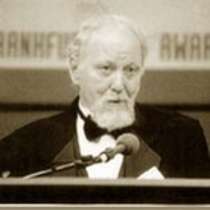
Biography
E. M. Schorb attended New York University, where he fell in with a group of actors and became a professional actor. During this time, he attended several top-ranking drama schools, which led to industrial films and eventually into sales and business. He has remained in business on and off ever since, but started writing poetry when he was a teenager and has never stopped. His collection, Time and Fevers, was a 2007 recipient of an Eric Hoffer Award for Excellence in Independent Publishing and also won the “Writer’s Digest” Award for Self-Published Books in Poetry. An earlier collection, Murderer’s Day, was awarded the Verna Emery Poetry Prize and published by Purdue University Press. Other collections include Reflections in a Doubtful I, The Ideologues, The Journey, Manhattan Spleen: Prose Poems, 50 Poems, and The Poor Boy and Other Poems.
Schorb’s work has appeared widely in such journals as The Yale Review, The Southern Review, The Virginia Quarterly Review, The Chicago Review, The Sewanee Review, The American Scholar, and The Hudson Review.
At the Frankfurt Book Fair in 2000, his novel, Paradise Square, was the winner of the Grand Prize for fiction from the International eBook Award Foundation, and later, A Portable Chaos won the Eric Hoffer Award for Fiction in 2004.
Schorb has received fellowships from the Provincetown Fine Arts Work Center and the North Carolina Arts Council; grants from the Ludwig Vogelstein Foundation, the Carnegie Fund, Robert Rauschenberg & Change, Inc. (for drawings), and The Dramatists Guild, among others. He is a member of the Academy of American Poets, and the Poetry Society of America.
PRIZE-WINNING BOOKS
BY E.M. SCHORB
Books available at Amazon.com
_______________________________________
Dates and Dreams, Writer’s Digest International Self-
Published Book Award for Poetry, First Prize
Paradise Square, International eBook Award
Foundation, Grand Prize, Fiction, Frankfurt Book Fair
A Portable Chaos, The Eric Hoffer Award for Fiction,
First Prize
Murderer’s Day, Verna Emery Poetry Prize, Purdue
University Press
Time and Fevers, The Eric Hoffer Award for Poetry
and Writer’s Digest International Self-Published Book
Award for Poetry, each First Prize
Amazon.com Author Robin Ouzman Hislop
Aquillrelle.com/Author Robin Ouzman Hislop
edtor@artvilla.com
robin@artvilla.com


